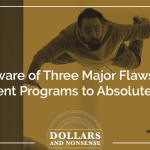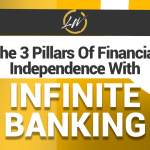In this episode, Nate Scott unveils the real reasons why retirement programs fail to produce financial independence for most people. He explains how they create a passive environment that is not conducive to wealth building, and how the timing of the market may not align with your life’s timing, making you constantly financially vulnerable. Nate advises people to focus on becoming financially independent through active wealth building strategies, such as infinite banking.
Ready to become your own banker and build financial independence through infinite banking? Schedule your FREE consultation now!
Key Takeaways:
- Retirement programs create a passive mindset that makes consistent wealth building impossible.
- Retirement programs do not do a good job of producing passive income.
- The timing of the market may not align with your life’s timing.
- Focus on becoming financially independent through active wealth building strategies can lead to a higher chance of success.
Episode Resources:
Gain FREE access to our Infinite Banking Course here
————————————————————————————————

LIVING WEALTH PODCAST
DOLLARS AND NONSENSE: EPISODE 240 TRANSCRIPTION
[00:00] Nate Scott:
In this episode, I’m going to discuss the real reasons why retirement programs fail to produce financial independence for most people. For some people, stuffing money into retirement programs may be beneficial, but for others, they can be detrimental to your wealth building goals. It all depends on how you’re mentally wired.
I’m Nate. I make sense out of money. This is Dollars and Nonsense. If you follow the herd, you will be slaughtered.
One of the primary reasons why retirement programs fail to produce true financial independence for people, and the first thing we’re going to talk about is the fact that I believe psychologically and philosophically retirement programs diminish your lifetime potential for building wealth, but it will all depend on how you’re actually wired.
[00:52] Nate Scott:
So we’re going to talk about this, but essentially this is the way I see it. Retirement programs are essentially you taking the easy way out financially. And anytime you take the easy way out financially, it’s unlikely you’re going to flourish.
In fact, it doesn’t even matter if it’s financially anything in life, whenever you choose the easy way out, it’s unlikely that you’re going to flourish. You can’t passively become financially independent or I mean, if you did, it’s like the lottery style or maybe you inherited money, but for the vast bulk of people, you cannot passively become financially independent.
So the biggest issue with retirement programs is the fact that it almost forces you into an environment that requires you to be passive with your money. It creates an environment, in other words, anytime anybody puts money into retirement programs, they actually put a barrier between them and their money, and this barrier creates an environment where passive financial planning becomes the norm.
[01:59] Nate Scott:
And I really do believe that the world at large, the government along with wall street, along with financial planners and people like me who sit here and make money. Trying to tell people what to do with their money. They actually do oftentimes want you to be passive and dependent on them so that you will keep money in whatever this account is so that they can get paid.
And so they, and of course there’s good people everywhere that are trying to do a good job managing your money. On the flip side though, whenever you decide to go that route the more barrier that they can create between you and your money with let’s say any time I put money in a 401(k) or an IRA It’s locked up there.
For most people it’s like putting it in into the freezer for later saving it for later You’re hoping it grows there but you essentially create an environment where touching it produces problems And if you’ve learned anything about life and business you want to create environments that That are conducive to flourishing like that’s the reality.
[03:05] Nate Scott:
The reality is you want to create and put yourself in an environment where good choices are rewarded and become the default. And so you’ll hear this all the time with maybe it’s like with weight loss or exercise or something like that, where if you have a whole bunch of chips in the pantry, you have a bunch of cookies on the counter and you have all of these things that are not conducive to eating better and create and becoming more healthy.
If those are at hand, it produces an environment where failure is more likely. Whereas if you rid your house of the junk food, it is more, it starts to create a barrier that protects you from failing, essentially, and the same thing goes in the world of business oftentimes.
So if you are in business or even at your job, I think all of us can understand that there are certain times of the day that we perform better. There are certain distractions that create environments that cause problems. Like for me, I like to do deep work at a coffee shop, not sitting here in my office, in the marketing studio where emails are pinging in and people are calling and clients are texting.
[04:17] Nate Scott:
Your environment matters a lot. And so, whenever someone comes up to me and asks the question, Nate, why don’t you, you know, should I put money in my 401(k)? Should I put money in my IRA? Or should I do infinite banking? You know, which route should I go? It is so much deeper. It’s a psychological, philosophical question.
Because what I firmly believe, Is that when you choose to go down the infinite banking route, you are putting yourself in an environment that you can flourish in. Of course, it’s going to be more dependent upon you as opposed to the passive approach where you essentially abdicate your responsibility to build wealth by getting your hands on it.
You, you set it aside and you, and you essentially forget about it. This is the set it and forget it style mentality where it is unlikely that you’re going to become financially independent by just working at your job and setting money aside into 401(k)s and IRAs.
[05:23] Nate Scott:
What I believe more, essentially the message of infinite banking is that you can create an environment where it’s more likely that you will grab life by the horns and create something that is more with the money that you’re saving and investing as opposed to the passive approach, it’s a much more active lifestyle.
Nelson Nash talked about it in this way, where he was talking about the environment when he wrote his book “Becoming Your Own Banker” that discusses the infinite banking concept, you know, from the source, the guy who created it.
He talked about whenever you’re flying an airplane, he believes that infinite banking is like `adding a perpetual tailwind, whereas if you do the conventional banking world and investing world, it’s more like having a perpetual headwind where opportunities come much more easily to someone who’s focusing on accomplishing things with money.
[06:18] Nate Scott:
We’re like infinite banking does produce kind of a tailwind factor. If you have a ton of money sitting around available to you to use at any given moment’s notice with no real barrier between you and your capital. It produces this world in which it’s like having a tailwind all the time. If your money is growing, compounding with no risk and no taxes inside of a policy, it’s creating an environment like that.
Everything else becomes easier and more profitable. Whereas if you are stuffing money into retirement programs, it’s kind of like having a bit of a headwind because there’s a barrier between you and your money. So anytime you would, maybe an opportunity would come first off, you’re not looking for them because you don’t have any money to take advantage of anything anyway, it’s all locked up on the side for the most part.
[07:01] Nate Scott:
And so there’s this barrier where it’s not like having a tailwind financially. You get the results that you get depending on how the market does. So if someone asks me, should I do infinite banking or should I continue to fund retirement programs? I think what they’re wanting from me is essentially saying to them, Infinite banking is better because policies produce higher rates of return than the stock market historical average or something like that.
I think that’s what they’re wondering if I’ve done the analysis here. And so what I’m trying to say is that is not that, that should never even come up into the equation because infinite banking is not about buying a life insurance policy and just letting the money sit and never taking advantage of anything else in your life.
Some people do it that way and that’s actually totally fine to some degree. In other words, if you love the security and safety and stability of whole life insurance policies and you don’t like stock market investments and the volatility and you just want to preserve the wealth and grow it on a very steady basis, sure, go ahead.
[08:07] Nate Scott:
But we’re saying that’s not true infinite banking. So, essentially what I’m trying to bring up is that I’m not of the opinion that whole life insurance policies produce a higher rate of return than other investment alternatives. That’s not what we’re doing here. I hope that comes across. I’m not sitting here saying you’re going to earn a higher rate of return in a policy than by putting money in your 401(k).
In fact, I could, it would be easier to make the argument that the historical average of the stock market has exceeded the growth rate of life insurance policies. But remember, That’s not what we’re after. The decision of whether you should do retirement programs or whether you should do IBC depends on, do I want to achieve financial independence, get my hands on money, create a perpetual tailwind financially, and build an environment that’s conducive to flourishing by me actually not choosing the passive easy way out, but choosing maybe the more difficult, but much higher potential route of using my money myself.
[09:10] Nate Scott:
And so you’re choosing the path. I’ve talked about this many times on the podcast where there is a passive, easy way out pathway of retirement planning. Then there is this other pathway that infinite banking fits in with that is meant for the people that are trying to get their hands on the money.
So deep down the very first thing I wanted to say about why I feel that retirement programs fail to produce true financial independence for the vast majority of people. It is not based on their inability to produce a high rate of return. It has something to do with it. It has to do with creating an environment that’s extremely passive that really is not conducive to any true flourishing.
And you should look back to previous episodes where I’ve talked about this, like my empire over retire analogy, and investing on the barbell spectrum and all of these awesome concepts that I’m sure I’ll dive into again, but you can go back in previous episodes and find those where if those things are compelling to you, then infinite banking would also be compelling to you.
[10:14] Nate Scott:
If those things are not compelling to you. Then infinite making might not be compelling to you, but deep down whether you should stuff money in retirement programs or whether you should go, you know, do something else with the money, i. e. put it into policies and then leverage those policies to achieve things depends a lot on your philosophy, what you really want to do.
I believe that essentially 50% of the population is probably wired to enjoy the passive retirement program lifestyle. In fact, they maybe even need the barrier between them and their money because they would mismanage it if they had it. So probably for half the population, the retirement program lifestyle is perfect.
For the other half of the population, I think that the infinite banking concept and getting your hands on your money is probably going to produce a much higher end result in a much sooner reality of financial independence and security , than going the retirement program route. So you have to determine how you are wired and then make a decision from there.
[11:37] Nate Scott:
So the first one had all to do with the philosophical approach. The second one that I wanted to discuss here is a much more practical thing, and that’s just simply the fact that retirement programs do not do a good job at producing passive income.
And this is just a reality. I don’t know why. So hear me out. If you were to one day retire, which, you know, I’m not a huge fan of the word, but if you want to become financially independent, you’re probably going to need an income source, correct? You’re going to need some sort of passive income source.
[12:24] Nate Scott:
So oftentimes you would assume that to be able to do that, you would want to choose assets that do a good job at producing income. The problem with retirement programs is the vast majority of them do not do the best job at producing income. The income that they do produce is 100% taxable, unless it’s a Roth, but like in a traditional 401(k), traditional IRA situation, all of the income that you pull is taxed at the highest possible rates, ordinary income tax rates, as opposed to more passive income, which would be offset by depreciation and other things. Oftentimes, lower tax rates overall than just pure essentially earned income style tax rates.
So, on top of anything that you have to sell to produce income is normally a lousy way to produce income deep down. So in the world of retirement programs, you have to liquidate assets, you have to sell assets for the most part in the vast majority of cases, you have to sell your stocks and you’re hoping that the appreciation of the stocks and the mutual funds will, and maybe hopefully, maybe you have some bonds in there that produce income as well.
[13:34] Nate Scott:
But you’re just essentially hoping that the appreciation and the income produced by these things will exceed your requirement. The problem is that it’s so unknown, it’s so volatile overall and it’s so out of your control that it’s very hard to feel very safe and secure compared to potentially other things.
Private lending, private equity investments, business investments, real estate. There’s many different things that you can get into that are actually quite good at producing income and you don’t have to wait until you’re 60, 65 years old. To start having the income being produced from these things.
You can start to benefit today. You can create what we call living wealth. You can create things that actually help you, not whenever you’re 65, but right now, which is very exciting. So I just don’t, if you want to become financially independent, I just don’t think retirement programs are the best solution to do that.
[14:34] Nate Scott:
I just really don’t. I think that objectively speaking, they’re not that good at producing income because we have to sell assets. And that leads us into the last point I wanted to make point number three, which is that your life’s timing and the market’s timing may not line up very well. And this of course is the big doozy for most people who are nervous about the stock market.
I do know that the stock market historically goes up over time and averages a pretty solid rate of return over time. The problem is that due to the volatility, the timing of the market and the timing of your life may unfortunately be at odds with each other. And the only way to end up knowing if they’re at odds with each other is some sort of gamble into the future.
[15:20] Nate Scott:
So if you go back to the dot com bubble bursting in 2000 and 2001 or you go to the great recession in 2008 and 2009 and you talk to the people who were hoping to quote unquote retire at that time, their life’s timing was and the timing of the market did not line up. And so they had to continue to work and wait for the account to balance.
Some of them retired and they didn’t wait and they had to retire. Unless essentially all I’m trying to bring up is that whenever you start to build your life on retirement programs as the foundation of your life, It’s no matter how you skin it, market timing is always market timing. So people, you know, you’ll hear people say, invest for the long term.
Don’t worry about the ups and downs of the market. Don’t try to time the market. Just stay in and stay in for a long period of time. And what I would say is, yeah, that’s great during the accumulation years. But once you get to the distribution years where you actually need to pull money out to pay your bills and live a lifestyle that you want to enjoy.
[16:25] Nate Scott:
You no longer have the luxury of waiting it out. You are simply going to start selling off your stocks, potentially at a steep loss to produce income, and it can create a very unstable place. So this is why I think deep down it really is with the market. because of the volatility, because it’s not real cash flow and real money.
It’s only paper money based on valuations that can change overnight. Because of those facts, it will always be about timing, and based on the timing, it might work out very well for you. It also might work out very poorly for you and it’s completely out of your control. That leaves me unsettled.
And so that’s one of the main reasons why I don’t partake inside the market. Now as I mentioned though there are some, I thought we’ll end with this, there are some times where investing in the stock market can actually make sense and using retirement programs. But here is my take on it as opposed to the conventional take. So the conventional take is that all of your true long term wealth should be stuffed into your IRAs, your 401(k)s and your brokerage accounts, essentially stock market, Wall Street based funds.
[17:44] Nate Scott:
And you can, if you want, diversify a little bit out of those funds, maybe add a little real estate on the side. Maybe add some gold and silver, maybe add some life insurance policies, you know, maybe have some diversification, but the first thing is maximizing all of your retirement programs. I actually think it should be the opposite of that.
So here’s my viewpoint. I think that you should seek and put forth your energy towards becoming financially independent. I think that at the foundation of your financial life should be the things that are going to produce true financial independence and consistency to your life.
Things like stuffing money into policies, leveraging those policies to go achieve things as you move forward in life, in the world of business and investing to start becoming something, becoming an expert, becoming an a player at some form in the world of finance, whether that’s investing in real estate, whether that’s investing in private loans, whether that’s investing in private equity, passive investments in other people’s businesses, whether that’s owning your own business.
[18:50] Nate Scott:
I think all of these things should really be at the bottom, things that are, you are more in control of and that are better at producing income so that you can become financially independent, not at age 60 or 65. And even then you might not feel very financially independent, but you can do it within 10 years for most people honestly.
Becoming financially independent. If you become focused on it, you can do it. You just can’t do it in the world of retirement programs. I mean, you can do it within 10 years doing it other ways. So I think that should be at the bottom. But if you have built up this foundation where there’s passive income coming in, there’s capital in policies, there’s a true foundation being built where you’re kind of financially independent at this point and there’s way more coming in than what you need.
[19:32] Nate Scott:
That’s when I wouldn’t be opposed to diversifying into, you know, neutral funds, brokerage accounts, retirement programs in general, the more conventional tools, it would be like the top of the pyramid, not the base of the pyramid.
So it would just be, yeah, we can diversify into those types of tools, not building your life based on brokerage accounts and retirement programs and then diversifying away from those to go build the things that I feel like are actually really weighty and that you control as the top of the pyramid, go ahead and have the retirement programs and other things be a small piece of what you do once you have focused on creating true financial independence.
[20:14] Nate Scott:
So I hope this has been helpful. Once again, I am not the kind of guy that is anti anything truly. So whenever someone asks me, Nate, should I do retirement programs? I’m not going to sell you on why policies are better than retirement programs. I’m just going to display reality. The reality is retirement programs produce a pathway and policies and infinite banking produces a pathway.
You have to choose which path you want to go down. That’s it. It’s as simple as that. It’s based on something much deeper, which one’s going to produce for me a higher rate of return. That’s not the question. The question is, which pathway do you want to go down knowing as well that you can technically do both at the same time if you wanted to.
I just think that focusing your first five to 10 years of true structured wealth building on becoming financially independent. Doing things that produce income that you control, becoming actually good at something in the financial world, not passive, but more actively involved in some things that will produce for you a very strong base.
[21:12] Nate Scott:
And then if you want to diversify into retirement programs, go for it at that point in time. Some of you watching YouTube might also look at me, have that, you know, a little cotton ball thing on my arm. It looks like I gave blood. Well, Hey, I practiced when I preached today, you know, the examiner just stopped by to do the life insurance medical exam for me to open a new policy, which, so it’s a fun day on that front.
Now, hopefully the results come back good. Maybe next week I’ll have the results. I’ll be able to tell you, but nonetheless, that’s why I had this on. I just thought I’d leave it on for fun. Just so I can say, hey, Nate’s buying another policy. As I tend to do one thing, I’ll note for all of you clients out there, don’t wait.
Sometimes I’m surprised, and just take this however you want, this is not the salesman Nate coming out. I’m just saying I’m a bit surprised that my clients don’t proactively want to expand their systems more often. Like, in other words, no one has to tell Nate when it’s time to open a new policy.
[22:09] Nate Scott:
It’d be like saying, if you’re investing in real estate, like no one has to sell a real estate investor on why they should buy more real estate. It’s like if we have the ability to do it, we’ll do it. And that’s kind of how we feel about infinite banking of course, like, hey, when’s a good time to open more policies and all the time. Anytime you have the ability to, you probably should.
So once again, the more the merrier. You can never have too much premium. Premium solves problems. It doesn’t create problems. The more premium you pay, the more cash value you’ll have. The more cash value you have, the more you can solve your life’s problems. The more you can achieve financial independence.
Never be afraid of premium. Never be afraid of opening new policies. This will be number 13 for me. And I’ll love it, I’m going for the Duggar family number of policies here in the next couple of years. All right, guys, so much for being here. It’s been so fun to have you on the show. This is Dollars and Nonsense. If you follow the herd, you will be slaughtered.
[23:00] Nate Scott:
Also, remember, guys, you can go to https://livingwealth.com/ and if you want to schedule a time with me, feel free to do so. Just fill out the contact form or the consult request form at https://livingwealth.com/. I’d be happy to talk to you more about infinite banking on a personal basis. So yeah, if you want to meet with me, just go to https://livingwealth.com/ and fill out the contact form there and we’ll get in touch. Talk to you later. Bye bye.










